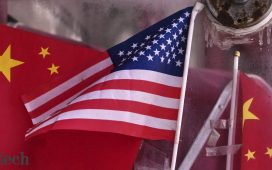USA and China trade relations, cooperation strategy. US America and China flags on chess king on a chessboard.
Prasit Photo | Moment | Getty Images
The U.S. is likely to impose more curbs to check competition from China as “the decoupling is really in full force,” said Steven Okun, founder and CEO of consultancy APAC Advisors.
“The question is to what extent and how broad will it be,” Okun told CNBC’s “Street Signs Asia” on Monday.
Last week, lawmakers voted 50-0 to advance a bill requiring China’s ByteDance to divest TikTok or risk the U.S. banning the popular video app. House Speaker Mike Johnson told reporters the TikTok divesture bill will be on the floor on Wednesday.
“So long as it is owned by ByteDance and thus required to collaborate with the Chinese Communist Party, TikTok poses critical threats to our national security,” according to a press statement by the Select Committee on the Chinese Communist Party.
The Committee wants a “reset,” with China Okun said.

“You prevent China from accessing the U.S. market, in particular, where the party can have some type of control, and then you build at home, as opposed to relying on China. So this is just part and parcel from a broader strategy,” he added.
The U.S. has been ramping up pressure on Chinese companies in recent years, especially in the semiconductor, EV and biotech sectors.
“This is going to apply to EVs. It is going to apply, I think, to broader renewable sector. It is going to apply certainly into biotech – I think this is the sector you want to watch next.”
The U.S. Senate voted earlier this month to approve a bill that could restrict business with Chinese biotech firms, such as WuXi AppTec and BGI, on national security concerns.
China is being perceived as a threat to the U.S. auto industry as U.S. vehicle exports decline and companies such as General Motors cut international operations.
China could flood the U.S. electric-vehicle market with its offerings, Energy Secretary Jennifer Granholm warned last week. “We are very concerned about China bigfooting our industry in the U.S.”
The White house last month said the U.S. was investigating whether Chinese vehicle imports pose national security risks, as they could collect sensitive data about U.S. citizens and infrastructure and send it to China.
China’s Foreign Minister Wang Yi told reporters last week that the U.S. has been coming up with “new ways to suppress China,” saying U.S. allegations against China had reached an “unbelievable degree.”
In October 2022, the U.S. introduced rules aimed at blocking China’s access to high-tech semiconductor chips and chip-manufacturing equipment amid concerns that China could use them for military purposes.
A year later, the U.S. said it was going to introduce more restrictions to close gaps that arose after 2022’s restrictions on AI chip exports went into effect.
“If it [U.S.] persistently monopolizes the high end of the value chain, and keeps China at the low end, where is fairness and competition?” Wang said.
— CNBC’s Evelyn Cheng & Clement Tan contributed to this story.










